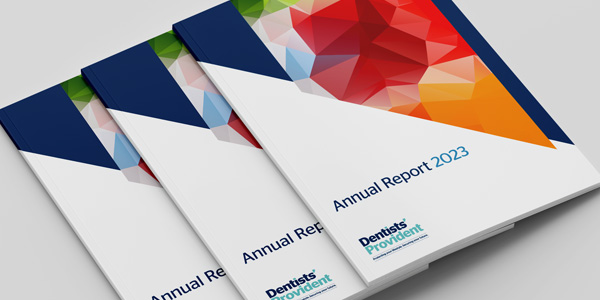
There are many things that are vital to a fully functioning dentist of every age; good eyesight, a flexible back, supple feet and of course hands and wrists with the manual dexterity for the most intricate of tasks. So does your left hand know what your right hand is doing?
Work-related musculoskeletal disorders (MSDs)
MSDs can affect the muscles, joints and tendons in any part of your body and many work-related MSDs develop over time through a lack of prevention or awareness of their causes. Once they do occur, they can progress from mild to chronic cases and can affect you in the short or long term.
There are many studies that look at MSDs in dentists, from early on in their career as well as in a hospital and practice settings. Many aim to get to the root cause of them and how they can be prevented, as there is a significantly higher occurrence of them in dentists compared to other graduates. From these studies, there appears to be a lot of similarity in terms of what contributes to them, such as unnatural static positions that are maintained for long periods of time, as well as repetitive movements and intricate or forceful exertions.
Hands and wrists…
While many dental professionals are aware of the dangers that bad posture can cause to their backs, necks and shoulders, many don’t consider the large number of conditions that can affect their hands and wrists. While injuries happen in the workplace, during sport or at home (like the dentist who lacerated their finger while chopping vegetables) there are also repetitive, age and genetic related conditions that can seriously affect the quality of your life and ability to practice.
In 2015 we paid over £15,000 to cover dentists for simple accidents and injuries to their hands and wrists that meant they couldn’t work.
Hand pain can be caused by anything from a trapped nerve to an underlying disease such as arthritis. Typical examples include repetitive strain trauma, hand-wrist tendon syndrome, carpal tunnel syndrome and epicondylitis.
A study undertaken in 2013 also noted that postgraduate prosthodontic students had the highest rate of wrist symptoms compared to other specialities, perhaps due to the use of vibrating instruments, even though they had fewer other MSDs, possibly because they have less time chairside while they were making crowns, bridges, dentures and other prosthetics.
In 2015 we paid dentists over £40,000 for conditions of their hands and wrists, which ranged from swelling and tendinitis to surgery and even an amputated finger that forced them to take time off work.
Types of injuries to your hands and wrists include:
Carpal tunnel syndrome (CTS)
We paid dentists nearly £60,000 in claims for CTS alone in 2015, as it is the most commonly diagnosed disorder of the hand and wrist among dental professionals. It is caused by compression of the median nerve in the wrist that then disrupts the nerve signals. Certain activities such as strenuous repetitive work and vibration or injuries can contribute to this compression.
A Dentists’ Provident member in her late twenties experienced pain and numbness while in practice; she couldn’t work because of it for three months and was diagnosed with carpal tunnel syndrome. She has managed the condition using a wrist brace and physiotherapy exercises rather than going down a surgical route and believes reducing workload and an automatic car have helped. She said “as a young dentist you don’t anticipate anything like this will happen to you, I’ve got over the worst now but I occasionally feel the symptoms still, I just know how to manage it.”
Repetitive strain injury (RSI)
A RSI is a pain in your muscles, nerves and tendons caused by a repetitive movement, such as the highly intensive activity of dental care for long periods without a break. It is also common in people with poor posture working in awkward positions.
Arthritis
Arthritis is a common condition that causes pain and inflammation in a joint due to a lack of cartilage and in 2015 we paid dentists just under £60,000 in claims for those unable to work because of it. Its cause can be down to your family history or because you have injured a certain joint at some point. There isn’t actually any cure, but there are many treatments that can help to slow down the condition and relieve your symptoms.
Tenosynovitis
Tenosynovitis is a condition that affects the synovium around the tendons. It is usually diagnosed as a RSI because it is caused by overuse or repetitive physical activity however, occasionally it occurs when a cut gets infected and bacteria cause inflammation.
There are variations such as De Quervain’s disease, which is a painful inflammation in the thumb, and stenosing tenosynovitis or ‘Trigger Finger’ basically when the finger or thumb bends towards the palm and the tendon gets stuck and locks. There are a number of approaches to treatment, but if you restrict the activity that caused the pain, it will usually recover in time.
A ganglion
A ganglion cyst is a fluid-filled swelling that usually develops near a joint or tendon. It's not clear why they form, but they seem to appear when the synovial fluid around a joint or tendon leaks and collects in a sac.
Prevention
Prevention is certainly the key rather than cure, of many of these finger, hand and wrist disorders, so it’s worth taking some time to review your posture and equipment, as well as fitting in exercises and stretches to try to prevent any of these symptoms before a problem can occur.
References available on request.
This article is intended for information only. It is not designed to give financial or medical advice, nor is it intended to make any recommendations of the suitability of our plans for a particular individual. Full details of our contract can be found in our rules on our website www.dentistsprovident.co.uk. Dentists’ Provident Society Limited does not accept liability and responsibility for changes made to this information. Some of the information in this article has been obtained from third parties. While we believe the information to be reliable; we make no representations as to its accuracy and accept no responsibility or liability for any error, omission or inaccuracy in the data supplied by any third party.
If you have any questions, please contact our member services consultants by emailing press@dentistsprovident.co.uk or calling 020 7400 5710.
If you have any questions, please contact our member services consultants by emailing
memberservices@dentistsprovident.co.uk or calling 020 7400 5710.

Our 2024 Annual General Meeting will be held at 91-94 Saffron Hill, London, EC1N 8QP on Friday 24th Ma…
Read more
The 2023 annual report from Dentists’ Provident, a leading income protection provider for dental profe…
Read more
Our next exhibition is the British Dental Conference & Dentistry Show in May, where we look forward to meeting anyone interested in becoming a member or members wanting to discuss their plans.